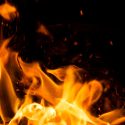You may think you’re prepared for any type of fire emergency, but did you know that there are five classes of fire, and that each must be put out in a different way?
Read on to learn more about each class of fire, and how you can keep your building, your family, your guests and yourself safe.
- Class A: This type of fire is common around households and businesses. Class A fires ignite from common flammable materials, including wood, fabric, plastics, paper and trash. It’s also a common type of wildfire. Typically, pouring water on a Class A fire will put it out, however, if the flames become larger, it is smart to be prepared with a pre-installed fire sprinkler system.
- Class B: This type of fire utilizes flammable and combustible materials along with a fire accelerant. Included are liquids such as gasoline, acetone or oil, and even includes vegetable oil. Smothering this type of fire deprives it of oxygen, meaning it can no longer burn.
- Class C: Most electrical fires fall into this category. To put out a Class C fire, first make sure the electrical circuit is no longer active. Then, use something that won’t conduct electricity to put the fire out, like a fire extinguisher.
- Class D: This type of fire, also known as a combustible metal fire, poses danger in laboratory and industrial environments. Common extinguishing agents, like water, can actually be hazardous, so use a dry powder agent.
- Class K: Class K fires are your common cooking fire, also referred to as grease fires. Kitchen or galley fire extinguishers can usually put them out.
Fire Tech Residential Sprinklers, LLC provides dependable fire sprinkler design and installation in Maryland, DC, Pennsylvania and Virginia. We would love to help you begin your next building project with the safety protection of a fire sprinkler system! Contact us online for your free estimate today.

I had no idea that there are so many different types of fires that can start and cause problems, so I appreciate you taking the time to explain them in this article! Thanks for sharing that a Class C fire covers most electrical fires and that a fire extinguisher should be used once the circuit is not active anymore. My sister is in charge of improving the safety of her marketing company’s office space for the rest of the summer, so I will make sure she knows how important it is to have a good fire extinguisher!